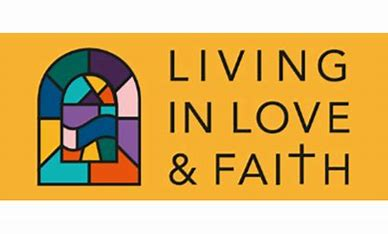As the Church of England's General Synod prepares to meet next week, which will include the latest conversation and decision-making in the ongoing 'Living in Love & Faith' process, Birmingham's diocesan synod met informally yesterday, to enable our General Synod reps to hear some of us reflect on where it seems like we're at. I offered something like the following brief reflection.
It's important, I think, in these conversations for each of us to try hard to locate ourselves a little - to resist the temptation to speak from an imagined (and illusory) abstract, objective or universal place.
So I come to this as a straight, ordained man. With the structural privileges and experiential ignorances that accompany that location.
I come also as a someone for whom marriage has for many years been a profound gift, and a demanding, vulnerable, costly place (albeit one place among a number of others) within which I've been able to explore and continue working out how to be a faithful disciple of Jesus, in giving and receiving love.
I was 16 years old when Issues in Human Sexuality was published. And have sought to engage with the CofE's conversations on sexuality ever since then, including doing my very best to listen to and learn from both my LGBT+ siblings and colleagues, and from conservative siblings and colleagues too.
In this most recent moment on this long journey together, it has particularly struck me that there's a need to 'dig down' into the ongoing conversation: to try to discern what's going on 'in the depths', 'in the roots' of the issues, the disagreements, the wrestling. And it's struck me that so much of the current conversation is not, at its roots, about sex, or marriage, or how we read Scripture. It's about ecclesiology - our understandings of what it means to be church.
It's about what we do with deep difference.
It's about how we acknowledge power, and vulnerability, and how we use power, and respond to vulnerability. And than requires us to recognise that, when the conversation polarises, as it so often does, into 'sides', these sides are not symmetrical. Power and vulnerability are unevenly distributed.
It's also, at root, about who we are prepared to recognise as fellow members of the body of Christ. That's why this is fundamentally an ecclesiological question.
Are we prepared to recognise those who read Scripture very differently to us, but with just as much desire to read it faithfully? This is not, despite some caricatures, a debate between those who read Scripture faithfully, and those who follow the trends of our wider culture.
And neither is it a debate about, on the one side, faithfulness and holiness in covenantal sexual relationships, and on the other side a laissez-faire, 'anything goes' approach to sexuality. At the heart of the debate is the question: are we prepared to recognise those who seek to embody Christ's faithfulness and holiness in covenantal (and sexual) relationships, within a couple who just happen to be of the same sex?
Personally, I passionately believe that it is God's gracious will and desire that such faithful Christians should be able to participate in the profound gift and costly school of discipleship that is marriage - and that in so doing they will enrich and deepen our shared understanding of what marriage is and can be at its best.
But to move forward at this particular point in the conversation, at this point in the process, I also passionately believe that we need to pay most attention to our ecclesiology, and how that shapes our ways and processes of thinking, speaking, listening, and decision-making.
How can we embody care and truthfulness in how we characterise those we disagree with - so that we do not fall into the sin of 'bearing false witness'?
How can we recognise the uneven distribution of power and vulnerability in these hard conversations and decision, and seek Christlike ways to address this?
How can we seek ways of embodying Paul's vision of the body of Christ, with all its diverse gifts, gracious mutual recognition, and intimate interdependence (the opposite, I would suggest, of the idea of 'structural differentiation')?
To my conservative siblings especially, I want to say:
I love you.
I recognise and respect your attempts at faithfulness and holiness.
I don't want to impose my ways of reading Scripture on you.
I want and need you as flourishing fellow members of the body of Christ.
I wonder if, and how, you might find your way to say the same of me, and my LGBT+ siblings too?

Thanks Al. Wise as always.
ReplyDeleteThanks for this. I found it helpful. I have been reflecting on fruitfulness and also Paul's example of the Body of Christ. Neither "part" can say of the other, "I have no need of you"! It is challenging.
ReplyDelete